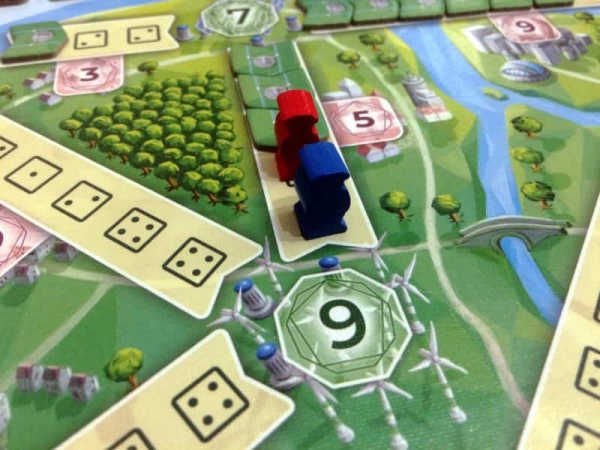An interesting question Phil Gross recently asked is why low-interaction games are so popular these days. Even though I'm not really sure whether these types of games are actually popular nowadays, I do wonder why people like games with very little player interaction. So in this article, I want to look at the attraction of games that are either completely multiplayer solitaire or provide very little opportunity for players to interfere with each other's game.
Personally, I love games that have a good amount of player interaction, both negative and positive. Mind you, I only love these types of games when there are at least three of us playing. Especially games with negative interactions in a two-player setting often feel too aggressive to me. If a game forces me to apply a negative effect on another player, when that effect has no benefit to me and there is only one other player in the game, it's particularly stupid, in my view. In a three or four-player game that negative effect could be applied to whoever is in the lead or in second place and then it makes sense. When it's just the person sitting opposite you and you have no choice in the matter, then it's just mean.
Don't Be Mean
I suppose that's actually one reason why some people love multiplayer solitaire games where nobody can be mean to anyone else around the table. One person in our games group loves games where nobody can interfere with them. I think generally speaking, they don't like meanness in games, not only when it is directed at them. They aren't particularly comfortable having to choose another player to negatively affect in some way.
I guess they prefer games where everyone just pits their wits against everyone else. They don't like it when there are ways to trip other players up. It's a bit like running a race. Whoever is the best runner wins. Doing something to slow other competitors down is not allowed and unsportspersonlike. It's the same for multiplayer solitaire board games. You just do your own thing and develop the best possible strategy to win. Nobody is allowed to interfere and force you to change your approach.
There is another reason though. That player in our games group who hates direct player interaction is also usually the person who wins games. They are very good at working out how a game functions under the hood. They can see where points come from and how to get them. That makes them a bit of a target in our group. However, even when two other players gang up on them, they still often manage to win. So we feel we're right in being a bit mean to them. Even when we join forces, we usually still lose. Understandably, that player doesn't like being picked on and therefore prefers multiplayer solitaire games.
Me Time
The advantage of games without player interaction is that you can really focus on improving your strategy. Game after game you'll have learned something new. You're likely to get better every time. You even get a chance to try out weird and wonderful ideas and see how they fare. I suppose that's not always true of every game without player interaction. It will depend on how variable or random these games are, but in principle, they are better positioned to let you really focus on your own way of playing.
 A close-up of the player boards with the powerlines and their pip values, as well as the differently coloured workers that represent the dice
A close-up of the player boards with the powerlines and their pip values, as well as the differently coloured workers that represent the dice
Multiplayer solitaire games can also allow you to get into your zone. They can become meditative and allow you to switch off. I suppose that's one reason why I don't usually like these types of games. When I play with friends, the social element is important to me. If I just focus on my own game and don't interact with anyone else around the table, not even within the context of the game, then there is something missing for me. However, if you are not comfortable in a social setting, then a game where you just do your own thing within the magic circle of the game is probably really useful.
I suppose that's one of the reasons why many people love solo gaming. There is nobody else who will mess up their plans, other than the game itself. They can just do their own thing and focus on playing. It's probably even more of an immersive experience in a way. Without table talk or other people trying to talk to you, you can really dive into the setting and fully experience the story that the game is trying to tell.
Cooperative Games
So far, I haven't explicitly said that I was talking about competitive games. I would say that the terms "multiplayer solitaire" and "player interaction" usually apply to these types of games. However, if you don't like player interaction, especially negative one, then maybe you'll like cooperative games. These aren't multiplayer solitaire games as such, but there is certainly no direct player interaction, at least not any negative one.
At the end of the day, solo and cooperative games are really closely related. I know that not every solo game works as well with more than one person, just like not every cooperative game provides the same experience when played by yourself. However, there is certainly a lot of overlap. So, I would say that if you don't like player interaction, then solo games and cooperative games are something you should probably try.
I actually quite like cooperative games. It offers me a mix of social interaction while also allowing me to focus on my own game. I know that everyone around the table is on my side. We're all trying to defeat the game. Nobody is waiting for an opportunity to be mean to anyone else. However, there usually is no time in cooperative games where you can just focus on your own game and nothing else. So, you probably won't find the meditative element that solo or competitive multiplayer solitaire games can provide.
How About You?
As you can tell, I found it hard to understand why people hate player interaction so much. I hope I was able to identify some of the reasons why multiplayer solitaire games are so attractive to some people. However, I do wonder what you think. How do you feel about player interaction in games? Do you relish games where people have to be a bit ruthless and sometimes mean to each other? Or do you much prefer a harmonious game? Does it depend on the people you're with? What is it that you enjoy about games? As always, please share your thoughts in the comments below. It would be great to hear what you have to say.
 Games
Games How to resolve AdBlock issue?
How to resolve AdBlock issue? 



















